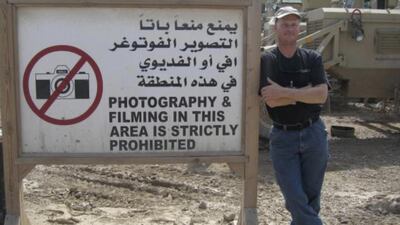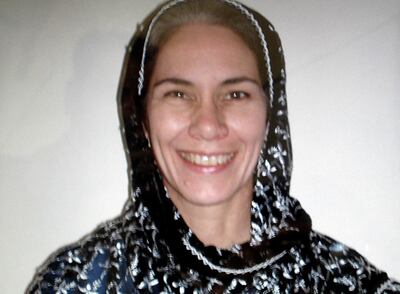President Joe Biden's plan to withdraw all US troops from Afghanistan this year will make it harder to track and rescue Americans held by the Taliban, a group representing the families of hostages said on Wednesday.
The James W Foley Legacy Foundation said in its annual report that the release of US citizens should have been a greater factor in talks before the US agreed to a peace deal with the Taliban in February 2020.
Three Americans are known to be missing in Afghanistan.
Mark Frerichs, a former US Navy diver, was working as a contractor when he was kidnapped in the capital Kabul weeks before the US-Taliban deal was signed. It is believed he was at the time being held by the Taliban-linked Haqqani network.
Cydney Mizell, a humanitarian aid worker who lived in the southern city of Kandahar, was kidnapped by gunmen in 2008. The US said she was probably killed the same year.
Writer Paul Overby disappeared in Khost Province, in eastern Afghanistan in 2014, on his way to Waziristan, in Pakistan's Federally Administered Tribal Areas.
The US is offering rewards of $5 million for information leading to the location, recovery and return of each of these Americans.
The foundation said it was concerned about the fate of hostages in Afghanistan with the prospect of a resurgence by Al Qaeda and the Taliban.
All US and Nato-allied troops – including those involved in special operations – are scheduled to end the country's longest war by September 11, 2021, the 20th anniversary of the terrorist attacks on New York and Washington that sparked the invasion of Afghanistan.
The group said once US troops had left, it would "become more difficult to generate the intelligence needed to find Americans and conduct rescue operations for current hostages held in the area”.
It said that falling US troop numbers was "an erosion of the leverage needed to make progress on resolving these cases”.
“The continued holding of US hostages undermines the credibility of any negotiation or deal on other topics with the hostage-holders,” it said.
Concerns Taliban could regain total control
The US said this month it was halfway through the withdrawal process and was on track to hit its September deadline. Observers fear the mass drawdown could clear the way for the Taliban to assume total control and reverse human rights progress made since the terrorist group was removed from power in 2001.
The report, based on interviews with former hostages, their families and officials, said it was broadly happy with changes brought in by the US government in 2015, which included an FBI-led hostage recovery cell.
But it said more needed to be done to make hostage recovery a greater priority during talks with enemies of the US.
Some families believed that securing the release of the hostages “was not made a precondition for any settlement during the peace talks in Doha, Qatar, with the Taliban”.
“Across conflict zones since 2015, in Syria, Yemen, Iraq, and Afghanistan at least, we have seen that Americans come home when US negotiators place priority on their return,” the report said.
US officials told The Washington Post that talks on the fate of hostages in Afghanistan took place behind closed doors.
They said it resulted in the Taliban taking custody of an American hostage previously held by the Haqqani network.
Senior US peace envoy, Zalmay Khalilzad, told Congress he had repeatedly demanded the release of Mr Frerichs and “enlisted the support of senior Qatari and Pakistani officials on his behalf”.
The American government said it would retain a US embassy presence, but that would become more difficult should the military’s departure lead to a Taliban takeover.
The US hopes that new technology, including drones, will help to bridge the intelligence gap.
The foundation was created by Diane Foley, whose son, James Foley, was killed by ISIS militants in 2014 while in Syria as a freelance journalist. The group tracks 54 publicly known people held hostage or illegally detained around the world.
Foley's death and that of other western hostages by ISIS terrorists led to the 2015 overhaul, after families complained that their voices were not being heard by the US government.



